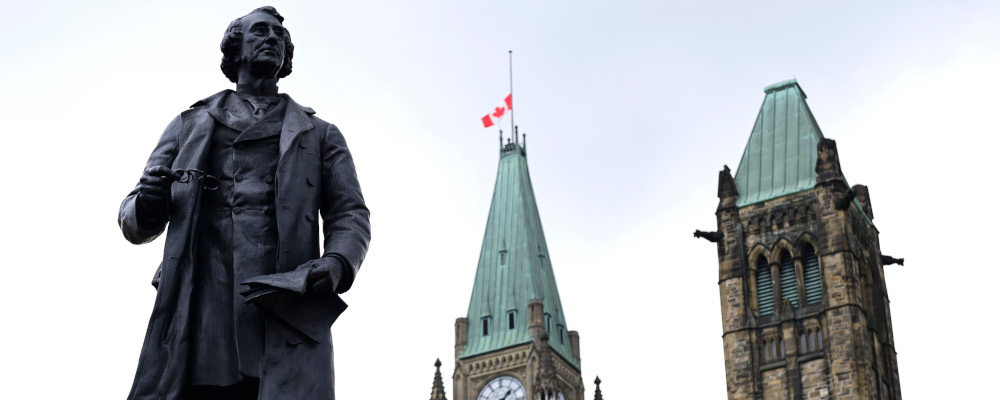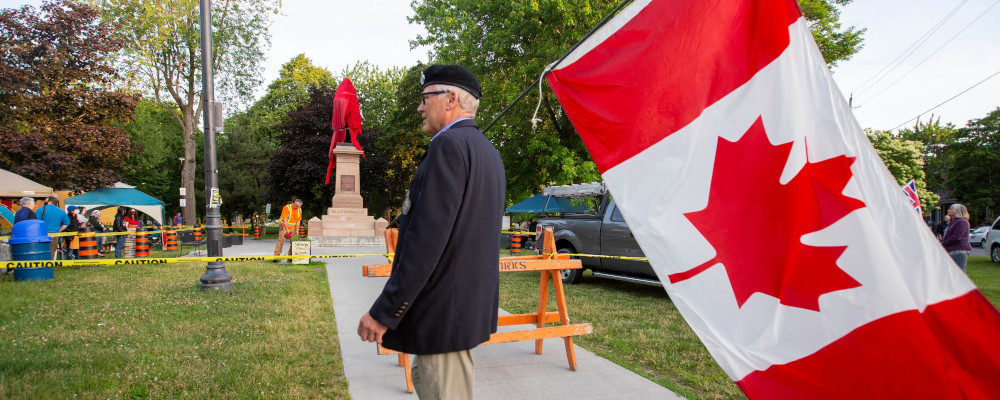On April 26, The Hub’s editor at large, Sean Speer, participated in a panel discussion at the Civitas conference on basic ideas of the Canadian conservative tradition. Below is a reproduced version of his opening statement.
I’ve chosen to interpret our panel topic as defining Canadian conservatism. Defining conservatism—especially in a handful of minutes—is a rather presumptuous task.
It’s a bit apocryphal but apparently William F. Buckley Jr., who I’d argue is the most important conservative public intellectual in the twentieth century, started on a book to define conservatism but never finished it.
He used to speak regularly on college campuses and whenever he was pestered to provide a succinct definition of conservatism, he would define it as “a paradigm of essences toward which the phenomenology of the world is in continuing approximation.” That usually shut down the exchange with an overconfident student or faculty member.

As a young person, I was consumed by the search for what one might describe as an indigenous Canadian conservatism distinct from American conservatism. The search was inspired in large part by Samuel Huntington’s famous observation that conservatism isn’t a universal ideology. It’s contingent and particularistic. It’s committed to conserving a set of ideas, institutions, and values that are unique to a particular jurisdiction or group. A Saudi Arabian conservative is different from a French conservative because he or she is aiming to conserve something different. It stood to reason therefore that there must be something that made Canadian conservatism inherently distinctive.
I must say that as I’ve gotten older, I’ve become less motivated by the search for a unique Canadian conservatism. That’s because I’ve come to the view that English Canadian conservatism is essentially part of a North American project—its purpose, by and large, is to conserve a liberal (by which I mean classically liberal) inheritance. It follows therefore that, at least in broad terms, we’re trying to conserve the same ideas and values—if not the same institutions—as U.S. conservatives.
I see the centre of gravity of English Canadian conservatism as “ordered liberty” or what modern American conservatives call “fusionism.” It represents a basic synthesis of Burkean traditionalism and new world dynamism. It involves a conception of liberty, personal freedom, and individual autonomy that’s rooted in an understanding of institutions, traditions, and norms that impose non-coercive yet powerful constraints on base human instincts and channels them in constructive directions.
As Stephen Harper said to this conference in 2003: “The truth is that strong economic and social conservatives are more often the same people—and with reason. Except at the extremes…the philosophical fusion is deep and widespread.”
The more interesting question for me, then, is less about what’s distinct about Canadian conservatism per se and more about the differences between English Canadian conservatism and Quebec conservatism.
But if I may leave that question aside perhaps for our discussion, I thought that I’d spend my remaining minutes reflecting on my own intellectual journey and how I’ve ended up here to the extent that it resonates with others.
My personal worldview has become somewhat dichotomous. It reminds me of Jonah Goldberg’s frequent point that conservatism might be best defined as “comfort with contradiction.”
As a father, I’ve become more conservative in my life and outlook. Yet, as a matter of government and politics, I’ve become more libertarian or liberal.
There are two main reasons for these developments. First, I’ve become so highly skeptical of state action in the face of such a string of government failures that I have to be careful at times not to succumb to anarchistic thinking. Second, reaching mid-life, which invariably comes with the reflection of one’s mistakes, wrong choices, and inherent fallibility, has caused me to be a bit humbler about politics.
It’s an interesting consequence of hard-earned wisdom. At the precise moment that I’ve become confident in my own views about virtue and the good life, a reckoning with my own failings makes me skeptical of imposing them on others. My conservatism, in other words, is increasingly rooted in a crooked timber view of humanity.

In this sense, I think of Canadian conservatism (and indeed North American conservatism) as fundamentally pluralistic. It’s about preserving a large swath of space for as many of us as possible to seek virtue, live out our conception of the good life, and pursue individual prosperity and stability as members of a liberal democratic polity.
But I’m not quite a Buftonian libertarian. I’m happy to make some accommodations within this framework that nod to normative judgements about the common good including:
- A broadly liberal political economy ought to have limits concerning trade and commerce with hostile states.
- A broadly liberal view of personal autonomy ought to accommodate constraints on individual freedom like age verification for online pornography, the criminalization of illicit drugs, or other instances where prudence causes us to intervene on behalf of children and the vulnerable.
- We ought to push back against the growing non-neutrality of public institutions as we’ve seen play out on university and college campuses across the country.
- A pluralistic public square doesn’t necessarily mean a relativistic one—there’s plenty of scope to argue that certain ideas are better than others and in some cases, this may even require legislating against illiberal actions or cultural practices.
- And, of course, I don’t believe that private institutions themselves need to be pluralistic.
Ultimately, though, my conservatism—and I believe Canadian conservatism (or at least English Canadian conservatism)—is about conserving the principles of the country’s founding ideas and institutions which were liberal and pluralistic.
We shouldn’t be disappointed by such a heritage. It’s one that had served us rather well for more than 150 years.
Recommended for You

Trevor Tombe: How is Carney going to pay for his commitments? There are some tough choices ahead

Need to Know: Legacy media has a diversity problem

‘A celebration of the spirit of Alberta’: Ryan Hastman on the political, economic, and cultural importance of the Calgary Stampede

‘Can we actually be an independent country?’: Michael Ignatieff on the 60th anniversary of Lament for a Nation




